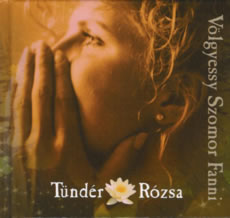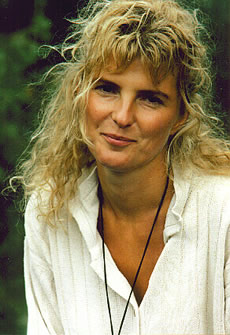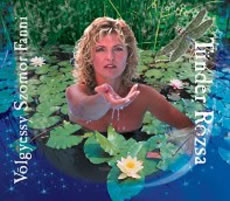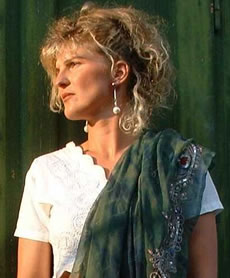|
(26 November 2002) Hungarian singer Fanni Völgyessy Szmor has been a Musical Discoveries featured artist since early 2000 when her album Hajnalban (Dawning) and recordings with the progressive rock group You And I were reviewed here. In April 2001 the group released their third stunning album Exit (review) and, after a series of live dates to promote the release, the artists continue to diversify and pursue various music projects. Fanni's latest project combines a lovely book of Hungarian poems with a new solo album comprised of eight tracks. She is joined instrumentally by two members of After Crying. Although the lyrics to the music are in both English and Hungarian, the book is presently only available in Hungarian. We are told that an English version is planned when interest in this project builds. All of the artwork is first class; the booklet accompanying the compact disc contains all lyrics and several photographs. About the title, Fanni's manager Robbert van Ende, says, "Tündér Rózsa is actually a play on words. When the words are written as one, tündérrózsa means waterlily or lotus. When seperated the two words get a different meaning." An earlier version of the project cover was a photo of Fanni amongst waterlilies (see artwork left). Robbert continued, "The classical meaning of tündér is pixie, elf, little person or fairy. Rózsa means rose." Robbert explained, "The whole word game gets clearer when we know that the region called Erdély--in the west, better known as Transsylvania, now a part of Romania, but until the end of the first world war it was a part of Hungary--is called tündér ország or country of the elves. It is from this part of the country most of the known Hungarian folk songs originate." He continued, "We know Ireland is known as the country of the elves, pixies, and what have you, thus making the connection to the featured Irish folk songs." When compared Irish and Hungarian folk music have a lot in common. "The rose is a symbol of love everywhere in the world. The rose in Hungary has an additional meaning as the person who is loved." The Book. The jewel case-size 50-page hard bound book is extremely well produced, chock full of artist photographs and other illustrations to support the writings. Says Fanni, "I never started out to write a book. I’m really a singer. I have been singing as long as I can remember. Singing in school, at home, in my head, in bands and as a solo artist, in studios and on stage." She continued emphatically, "So, I’m originally a singer, not because I’m in any trendy ‘hit list’ or because somebody in the media tells me that I am, but because I was born a singer." About the book Fanni says, "Already a long time ago I started out scribbling down my thoughts, my feelings, my pains and honestly never even thought of publishing them."She said, "For me these small ‘creations’ were just part of my everyday life like they are for everybody else. Just most of us never bother to write what we feel. I never even thought anybody else would get to read any of what you are now about to read." So how did the project come about? Fanni says, "It was only after people who are close to me kept telling me that I should let other people read these [poems], that I came up with the idea to bundle these small fragments of my, until now very private, inner world in a small book--that happens to comfortably fit any handbag!" She summarised, "[It is] a book with poems and illustrations that create an atmosphere that speaks of unfulfilled love, of pain, of longing for perfect unity, longing for a state of being that one might or might not be able to reach on this earth, depending on one's views and experiences." The Music. Originally planned to be a very short selection of only a few tracks, a full album emerged with eight tracks spanning a range of the artist's repertoire. Two are unique covers of traditional tunes including an extended version of "Wedding Day" ("She Moved Through The Fair") complete with lush keyboards and layered vocals and "The Bride." Enthusiasts will recognise a lighter version of "Utazás" than the one on Fanni's first solo album. Fanni is joined by Károly Binder, Zoltán Lengyel (After Crying) and Péter Pejtsik (After Crying) who contribute various string parts to the lightly arranged and delicate instrumentals. This is, of course, a vocal album and it features Fanni's voice at her finest. Says Fanni, "These are songs that were taken from, or inspired by, Hungarian and Irish folk music--a magical world in it’s own. I just had to record this music of course with help from my friends." The album begins with a spoken word poem read evocatively over light orchestration; Fanni's singing then soars over the instrumentals in "Márvány az ég alja" ("Heaven's Bottom is Made of Marble"). Fanni continues, "Being a musically oriented person I immediately combined the things that I wrote with music, with songs and tunes that are close to my heart and which for me perfectly match the atmosphere that I feel when I write--where words meet music." Wrapping up, Fanni said, "The CD complements--completes--the book with music, my music." And jokingly, "as I wouldn’t like people to start thinking I’m a writer!" A rich progressive-style tune full of lovely vocalise entitled "Bánat" ("Heartache") precedes the traditional tune "The Garden" sung gloriously in English and accompanied by lush equally strong instrumentals. Listeners will especially enjoy the pianoand cello solos. In "Szép szivárvány" ("Beautiful Rainbow") and "Szerelem emléke" ("Memory of Love") Fanni's sensually sung vocals are intertwined with classical piano melodies as well as prominent, moody and well-played After Crying-style cello parts. Layers of Fanni's a capella vocals provide a striking difference to the sound in the short "Imhol elén menek" ("Wherever I Go") which is recorded without further instrumentation. You And I enthusiasts will likely be entralled with Fanni's rendition of "Wedding Day" mentioned above; keyboard parts add a lovely texture to the tune. We especially enjoyed the piano and cello accompanied version of "Utazás" ("Voyage") which concludes the album. Fanni Völgyessy Szomor's latest project Tündér Rózsa is a passionate presentation of new music and the artist's personal writings. The plentiful inclusion of stunning photographs in the book and accompanying CD artwork is appropriate and not over-stated. Clearly worth a trans-Atlantic journey, this is a very highly recommended package; the CD is a must listen! 
|








